

Understanding Dyslexia and the Reading Brain in Kids. At a recent talk for special education teachers at the Los Angeles Unified School District, child development professor Maryanne Wolf urged educators to say the word dyslexia out loud.
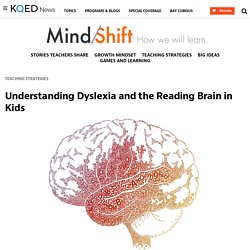
“Don’t ever succumb to the idea that it’s going to develop out of something, or that it’s a disease,” she recalled telling teachers. “Dyslexia is a different brain organization that needs different teaching methods. Tons of Fun with The Workout Kid - Red Top Mountain and Sweetwater Creek State Park. Elementary Matters: Ten Brain Based Learning Strategies. If you have been reading my blog for a while, you know that I'm absolutely fascinated by the brain, and am particularly fascinated by the research that's been done to prove the best learning strategies.
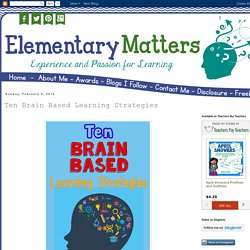
There's some great stuff out there! I read about the brain and learning daily, and just can't get enough. I've taught a few workshops about it, too. Even though I'm a second grade teacher, this stuff applies to all learners, from newborn babies to adult learners. 1. 2. 3. 9. The Brain-Information about the Brain.
1 Introduction “I think, therefore I am.”

—René Descartes, 17th-century philosopher Few of us question the crucial importance of the brain. It is vital to our existence. Our brains enable us to think, as René Descartes so skillfully pointed out nearly 400 years ago. The brain makes up only 2 percent of our body weight, but it consumes 20 percent of the oxygen we breathe and 20 percent of the energy we consume. Scientists have worked for many years to unravel the complex workings of the brain. How Does the Brain Retain Information? THE BRAIN FROM TOP TO BOTTOM. 4’33” (Four Minutes and Thirty-Three Seconds): What Our Brains Need. Glenn Whitman , Director, The Center for Transformative Teaching and Learning Posted 03/23/2015 12:49PM | Last Commented 11/16/2015 11:26AM As my students know, their brains fascinate me and my colleagues.
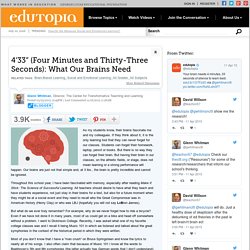
If they think about it, it is the only learning tool that they can never forget for our classes. Students can forget their homework, laptop, pencil or books. But there is no way they can forget their brain. Throughout this school year, I have been fascinated with memory, especially after reading Make It Stick: The Science of Successful Learning.
But what do we ever truly remember? Metacognition: Nurturing Self-Awareness in the Classroom. How do children gain a deeper understanding of how they think, feel, and act so that they can improve their learning and develop meaningful relationships?
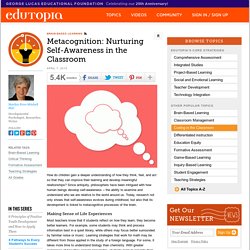
Since antiquity, philosophers have been intrigued with how human beings develop self-awareness -- the ability to examine and understand who we are relative to the world around us. Today, research not only shows that self-awareness evolves during childhood, but also that its development is linked to metacognitive processes of the brain. Making Sense of Life Experiences Most teachers know that if students reflect on how they learn, they become better learners. For example, some students may think and process information best in a quiet library, while others may focus better surrounded by familiar noise or music. Metacognition plays an important role in all learning and life experiences. Brain Based Learning. 8 Things Everybody Ought to Know About Concentrating.
“Music helps me concentrate,” Mike said to me glancing briefly over his shoulder.

Mike was in his room writing a paper for his U.S. History class. On his desk next to his computer sat crunched Red Bulls, empty Gatorade bottles, some extra pocket change and scattered pieces of paper. In the pocket of his sweat pants rested a blaring iPod with a chord that dangled near the floor, almost touching against his Adidas sandals. On his computer sat even more stray objects than his surrounding environment. Mike made a shift about every thirty seconds between all of the above. Do you know a person like this?
The Science Behind Concentration. THE BRAIN FROM TOP TO BOTTOM. Brain is not fully mature until 30s and 40s. (PhysOrg.com) -- New research from the UK shows the brain continues to develop after childhood and puberty, and is not fully developed until people are well into their 30s and 40s.
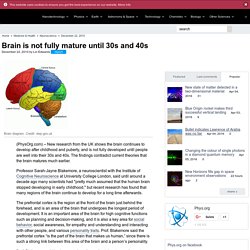
The findings contradict current theories that the brain matures much earlier. Professor Sarah-Jayne Blakemore, a neuroscientist with the Institute of Cognitive Neuroscience at University College London, said until around a decade ago many scientists had "pretty much assumed that the human brain stopped developing in early childhood," but recent research has found that many regions of the brain continue to develop for a long time afterwards. The prefrontal cortex is the region at the front of the brain just behind the forehead, and is an area of the brain that undergoes the longest period of development. Prof. Blakemore said brain scans show the prefrontal cortex continues to change shape as people reach their 30s and up to their late 40s.
Explore further: Study: Our brains compensate for aging. 11 Simple Ways to Improve Your Memory. Whether you want to be a Jeopardy!
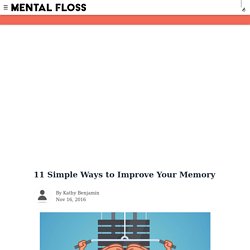
Champion or just need to remember where you parked your car, here are 11 things you can do right now to turn your mind from a sieve into a steel trap.